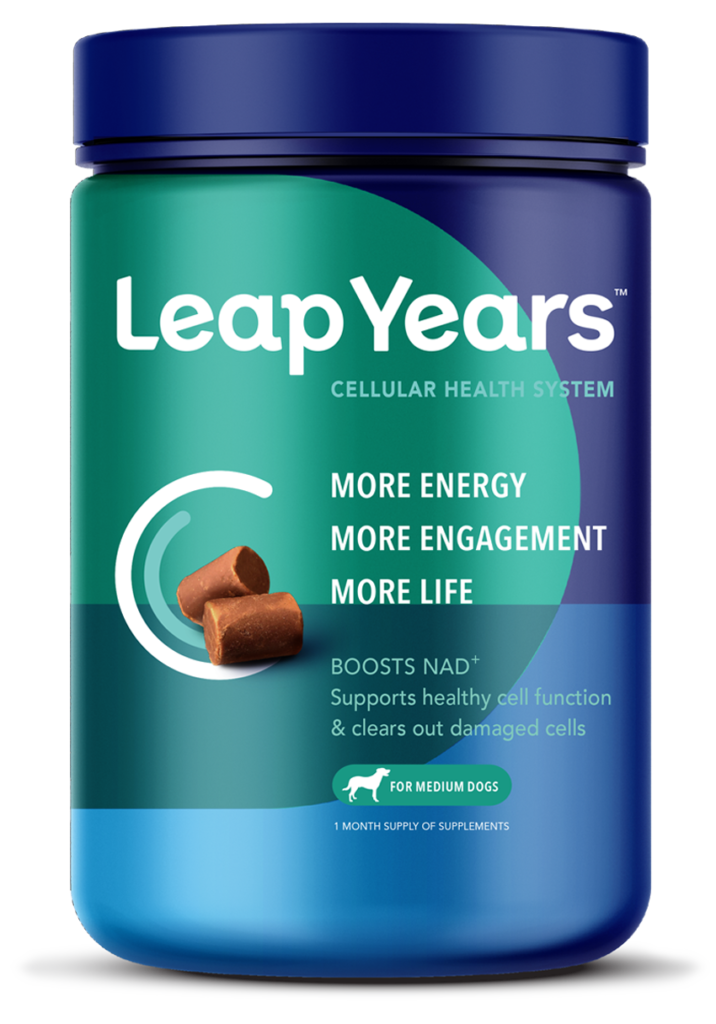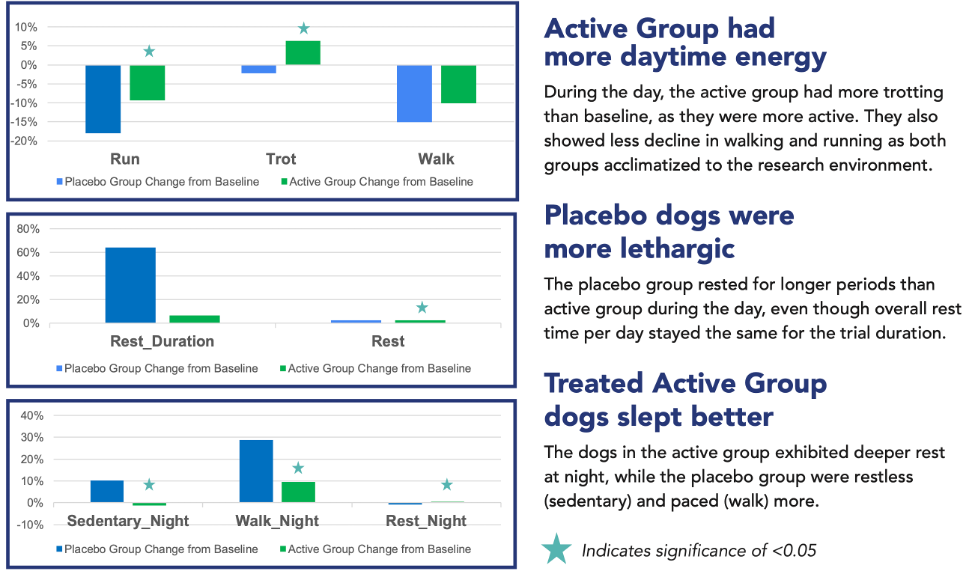While the focus of my professional attention, and my writing, has largely shifted away from complementary and alternative veterinary medicine (CAVM) per se and towards the field of aging, I obviously cannot escape the pseudoscience and sloppy or motivated reasoning that characterizes so much of alternative medicine as it pops up often in the aging biology domain as well. Aging is both a legitimate area of scientific inquiry and fertile ground for the growth of snake oil remedies. From the plausible but unproven to the outright ridiculous, purported “anti-aging” products abound, for humans and for our pets.
I’ve already written about the use and misuse of aging science to justify alternative practices in my review of The Forever Dog, where the framework of aging is used to try and give a shiny new luster to so many tired tropes and arguments from the world of CAVM. While attending the recent VMX veterinary continuing education conference in Orlando, I saw the usual profusion of dubious practices on sale, from the traditional nonsense of the Chi Institute’s ‘Traditional” Chinese Medicine training to cold laser devices and, of course, SUPPLEMENTS!!
What’s not to love about a dietary supplement? Virtually no regulation makes creating a new product orders of magnitude cheaper than developing a drug because there is no need to prove it works or is safe. And despite the lack of meaningful evidence for the vast majority of supplements on the market, vets and pet owners just assume they are safe and are willing to use them based on even the thinnest thread of hope that they might do something useful. Billions of dollars to be made with just a little creative marketing and negligible effort or expense for research.
And, of course, aging is a prime target for such supplements since we do not yet have properly validated medicines to target the underlying mechanisms that lead to age-associated disease. I believe such medicines are coming, but the work of development and testing is a lot slower and more challenging that simply extrapolating from some mouse studies and slapping a shiny label and the Quack Miranda Warning on a bottle of some dietary supplement, so it’s a hard temptation for many companies to resist.
While there have been veterinary supplements on the market claiming to target aging in pets for a while, the latest and most visible player in the Expo Hall at VMX was Leap Years from a company called Animal Biosciences.

What is It?
Animal Bioscience is a company founded by David Sinclair, his brother Nick Sinclair, and Virginia Rentko, a veterinary internist and researcher. I have written about Dr. Sinclair previously, reviewing his book, Lifespan. He is that fascinating and frustrating, but all too common, chimera- a talented scientist who produces legitimate and valuable research evidence and also a slick salesman who regularly promotes dubious or even clearly false ideas and products. He is particularly famous in the aging biology field for his research, and his business activities, in the area of sirtuins and resveratrol. I have written about resveratrol regularly since 2009, and it nicely illustrates the dangers and pitfalls of excessive hype, enthusiasm, and commercial products based on preliminary preclinical research.
Despite this controversy, Dr. Sinclair is still a prominent advocate for the dietary supplement approach to aging, and he focuses a lot of his attention now on compounds intended to boost NAD+, a ubiquitous and important element in multiple physiologic processes, including many related to aging. Dr. Sinclair has acknowledged taking one of these compounds, NMN, and recommending it to family and friends.
He is also involved in a company, Metro Biotech, that has produced a proprietary version of NMN. This company has been associated with some controversy recently when the FDA banned the sale of NMN supplements. The agency determined that NMN can no longer be classified as a dietary supplement because it is in the process of being evaluated as a possible drug through clinical studies overseen by the FDA. Some have made the claim that Metro Biotech is pursuing a strategy of using the FDA regulatory system to exclude forms of NMN other than its own from the marketplace, though this is only speculation.
In any case, Dr. Sinclair is listed as the founder of Animal Biosciences. The sole product of this company is a supplement called Leap Years. The company does not identify the specific compounds in its product, but one is claimed“ to restore cellular health by boosting NAD+ production,” and it is not much of a “leap” to suspect that the NAD booster they are using is NMN, or even the proprietary version of NMN made by Metro Biotech.
The other ingredient is also not disclosed but is claimed to be a senolytic. These are compounds intended to help with the removal of senescent cells, that is cells with abnormal replication and function that can promote age-related disease through increasing inflammation and other mechanisms. Popular examples include quercetin and fisetin.
The Claims
Animal Biosciences makes a lot of claims for their product on their web site and in the materials they provided at the VMX conference. These include-
- “clinically proven”
- “slows the effects of aging”
- “extends the health and vitality of dogs”
- Promotes healthy aging
- Increased or improved
- Cardiovascular function
- Circulation
- Joint flexibility
- Brain health
- Cognitive function
- More
- Vitality
- Engagement
- Life
The Evidence
The support offered for these claims includes reference to “molecules that have proven efficacy in humans,” reference to lab animal studies, and reference to a clinical trial conduction at NCSU veterinary school.
Since there are no proven medications or supplements that extend lifespan and healthspan in humans, the first claim is unsupported. Dr. Sinclair often makes such claims and then references pre-clinical or pilot studies in lab animals and humans, but this is a classic leap beyond the true probative value of these kinds of evidence that supplement manufacturers often rely on. Promising studies suggesting benefits based on basic mechanisms or animal model studies are useful for guiding us towards the most promising targets for real-world clinical trials, but they don’t make these trials unnecessary. Without real-world clinical trial evidence, claims of “proven” efficacy are unjustified.
Similarly, many things have been shown to extend lifespan in rodents and in a few other model species, but the devil is always in the details. Some interventions may work in some strains of mice but not others, in males or females but not both, or they may appear to work for one research group only to be unreplicable by other scientists, as was the case with some of Dr. Sinclair’s work with sirtuins and resveratrol. While the concepts of NAD+ boosters and senolytics are valid, and there is data supporting the potential of some specific agents, we do not have clinical trial evidence showing real-world benefits for this supplement or its ingredients in pet dogs.
Which brings us to the clinical study at NCSU. This study is still enrolling subjects, and no results have been published. Despite this, the company cites the work as evidence its product is “clinically proven,” which is inaccurate and unethical. Once the full results and methods are published, we will have a better sense of the strengths and limitations of this piece of evidence. Even if the results are encouraging, though, more will be needed to build a confident, reliable case that this product will make a real difference in dogs’ lives.

From the perspective of the basic science behind NAD+ boosters and senolytics, the existing evidence is encouraging but by no means definitive. NAD+ levels do decline with age, and this is associated with many negative health impacts that occur during aging. However, there is no consensus that NAD+ precursors or boosters are effective at slowing aging or reducing the risk of age-associated health problems, by raising NAD+ levels or by any other mechanism. Several companies sell NAD+ precursors for dogs, including NMN. None have been demonstrated safe and effective by high-quality clinical studies in dogs (or in humans).
Clearance of senescent cells using senolytic drugs is another popular area of geroscience research, and there are a number of compounds that have been investigated. Other companies also sell supplements claiming they are senolytics that will extend lifespan and healthspan in dogs (e.g. Fisetin Vet). However, as with NAD+ precursors, none of these compounds have been proven effective for this use in human or in dogs with reliable scientific evidence.
Bottom Line
Leap Years is similar to most veterinary supplements on the market: It is based on some plausible ideas with limited supporting evidence, and it is marketed with claims that go well beyond anything scientifically proven or reasonable. The potential risk are as uncertain as the potential benefits. While NMN and various senolytics commonly available as supplements have not shown obvious signs of causing health risks, the limited real-world evidence doesn’t allow us to say with confidence that don’t do harm, only that we haven’t found any yet.
As always, using a product with weak evidence for both safety and benefits intended to treat a broad variety of health problems in normal dogs who are currently healthy is a roll of the dice, and the potential outcome is hard to predict. If evidence emerges this specific product truly extends healthspan and lifespan in dogs, I will be first in line to recommend it, but that evidence will need to be a good bit stronger than it is right now.










I work at the NCSU vet school and my 12 yo MN Chihuahua mix was in the study. I won’t know if he got placebo or the study supplements for a while, but I didn’t notice any difference in his cognition, behaviour or his comfort.
I am very curious to find out which treatment group he was in, especially because he developed bladder stones just as he finished the study. Even if he was on the supplement we’ll never know if it was related. He’s had no signs of stones in a month or so. Treatment has only been a medicated diet and careful observation. As long as he seems comfortable I’m not rushing to do anything else.
Thank you for continuing to get this sane information out.
Pingback: The Latest in Veterinary Aging Supplements- Leap Years by Animal Biosciences | - Animal Blog
Pingback: The Latest in Veterinary Aging Supplements- Leap Years by Animal Biosciences | - Just another WordPress site
clam juice is what would have solved the cardiomyopathy problem in cats. Not sure i want to drink that every day https://www.medicalnewstoday.com/articles/taurine-may-be-key-to-a-longer-and-healthier-life
Thanks for your genuine explanation/ critics about the leap year. I personally think that hiding the name of active I gredients is not only unethical but it’s illegal as per the dietary supplement laws and regulations.
As a customer, I would like to know what is in the product. Simply naming the trademark but the actual ingredient is a malpractice.
Pingback: Can We Make Dogs Live Forever? |
Pingback: Science, Science Denial, & Drug Development- A response to Dr. Judy Morgan |
Pingback: Evidence Update: Leap Years Anti-aging Supplement Study |